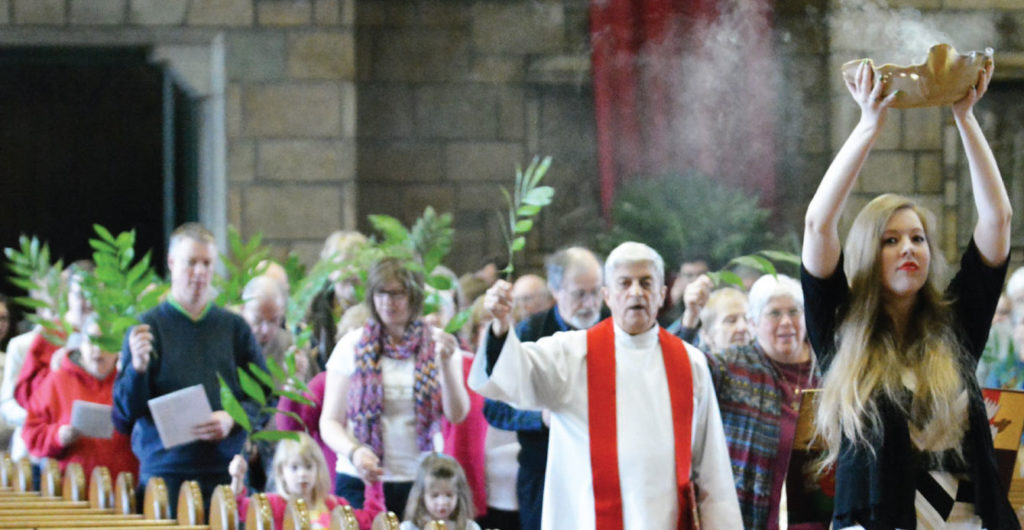
The welcome echoes Psalm 118, a ritual procession into the temple to express praise and gratitude for God’s saving help. At every Eucharist in the “Holy, Holy, Holy,” we proclaim the same psalm verses the people shout in the gospel. Jesus is the one who comes in the name of the Lord and inherits God’s promises to David. He is the messiah, who comes not in victory but in peace, riding humbly on a colt.
Palm/Passion Sunday begins Holy Week. The palm procession leads to the story of Jesus’ suffering and death. This year we hear the passion narrative according to Mark. It begins two days before Passover. The chief priests and scribes are plotting to put Jesus to death. Jesus is at table in Bethany at the home of Simon the leper.
A woman breaks open an alabaster jar of costly ointment and pours the oil on Jesus’ head. Israel anointed its kings by pouring oil on their heads. The woman’s gesture is a prophetic act that, like the words of blessing that welcome Jesus to Jerusalem, identifies him as the messiah.
Jesus affirms that “wherever the good news is proclaimed in the whole world what she has done will be told in memory of her.” Her action anticipates the reason the high priest condemns Jesus. It contrasts starkly with Judas Iscariot’s act of betrayal, which happens next as he goes to the chief priests and arranges to hand Jesus over.
The officials’ plotting, the woman’s anointing, and Judas’s betraying form a literary sandwich. The middle story is key, the meat of the sandwich; in this case, the prophetic anointing that marks Jesus as the messiah and readies him for death.
Jesus and his disciples then plan and celebrate Passover. At this meal he blesses and shares a cup of wine, identifying the cup of wine with his lifeblood. His prophetic words and gestures anticipate and interpret his death on the cross. Sharing the cup signifies a new covenant, a new agreement about our relationship with God. Ancient Israel ratified its covenant in blood, signifying that the people pledged with their lives to keep the ten commandments. The community that tells Jesus’ story understands his gestures at the last supper as a new covenant that expresses his willingness to love them unto death.
- What do you promise with your life?
The evangelist carefully constructs the plot so Jesus is nearly silent during his passion. As Jesus and his disciples move from the meal to the garden, he prophesies that one of his own will betray him; his disciples will scatter and desert him; Peter will deny him. We hear the passion today as insiders, who unlike Jesus’ first disciples, know how the plot unfolds.
Judas’s kiss fulfills Jesus’ prophecy that one of his own will betray him. When Jesus’ followers flee, they fulfill his prediction the sheep will scatter. The plot of the narrative has readied us for Jesus to say little during his passion as all that he anticipates happens.
- What do you learn about Jesus from his feelings and prayer in the garden?
- What is the cup he wants taken away but accepts?
Artfully the narrative creates an inside and outside scene during Jesus’ trial. Outside in the courtyard of the high priest’s house, Peter denies he knows Jesus. Inside the house Jesus acknowledges he is the messiah. The high priest asks, “Are you the Son of the Blessed One?” Jesus says, “I am.” These words translate the name of God in the Old Testament — I Am Who Am.
We readers and hearers of the story know what the characters in the narrative don’t yet recognize. Jesus is the messiah, whose suffering God will vindicate by raising him up. Jesus is I am, not a blasphemer.
Pilate asks essentially the same question as the high priest, “Are you the king of the Jews?” Jesus answers, “You say so.” His terse answer underscores the charge against him—his claim to be the messiah.
- How does the playing out of Jesus’ predictions affect you?
- What is the power for you of Jesus’ saying so few words?
In Mark’s gospel Jesus endures flogging, mocking, and crucifixion without speaking. As he is dying on the cross, he prays Psalm 22, “My God, my God, why have you forsaken me?” We experience desolation in his few words.
Jesus is not alone as he dies on the cross. Mary Magdalene, Mary the mother of James and Joses, Salome, and other women disciples stand with him at a distance. Mary Magdalene and Mary the mother of Joses witness him buried.
The passion narrative gospel leaves us in desolation. Who are we like — the betrayer; the disciples who flee; Peter, who denies Jesus; the women who stand with him but cannot ease his suffering and anguish; Joseph of Arimathea, who shows up to bury him?
- With which disciples do you identify?
- Which of Jesus’ predictions has not come true at this point?
- What insights do you gain from having a post-Easter point of view of the passion narrative?
